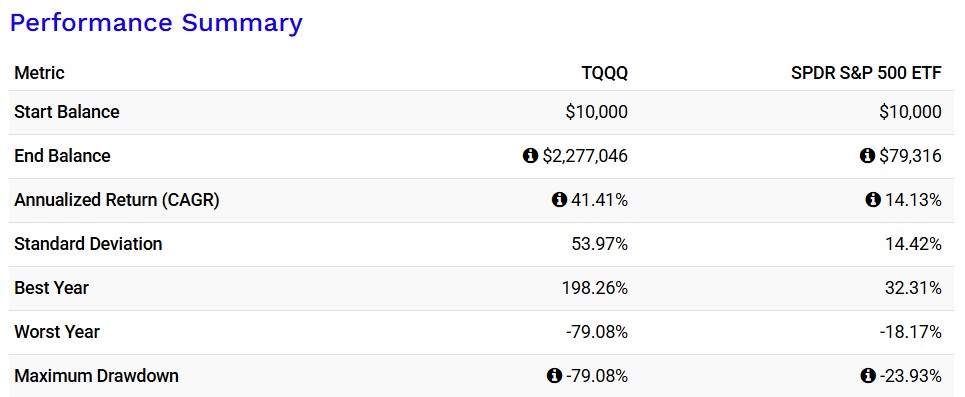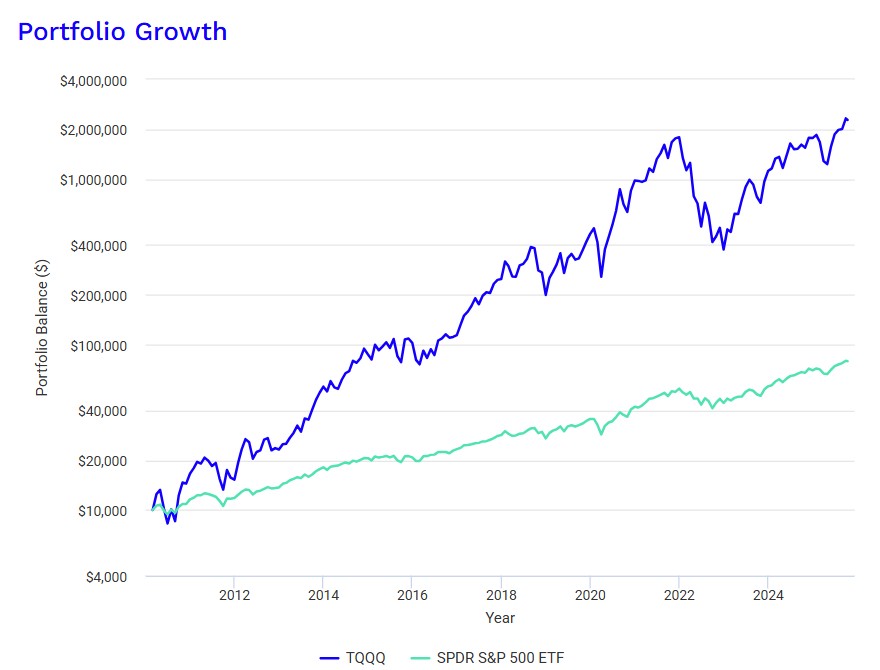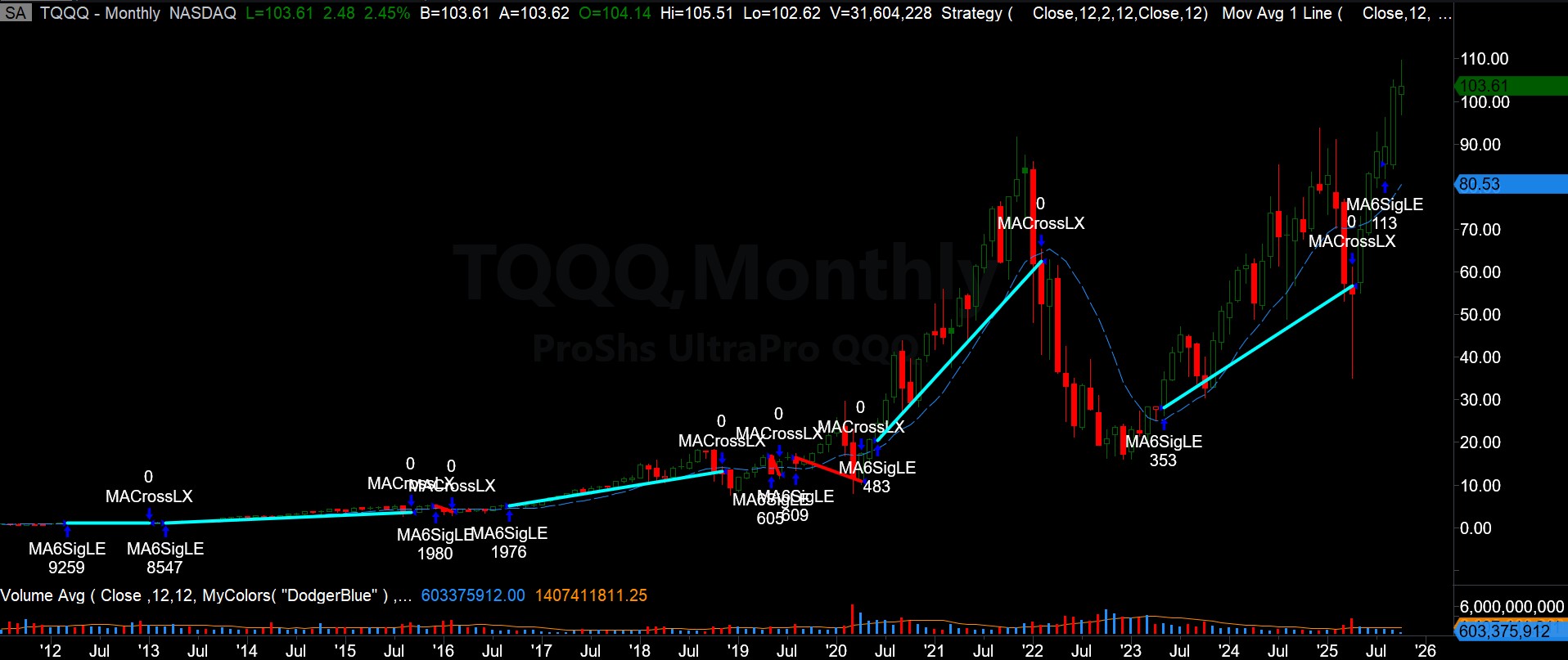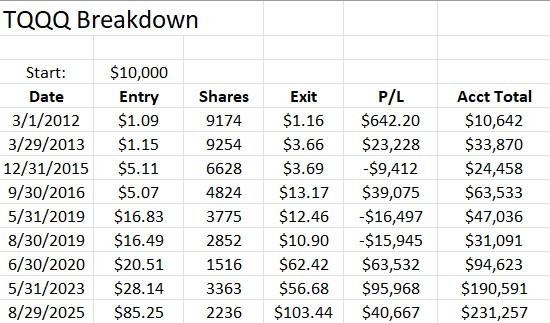Trading TQQQ With The Incredible System
- Subscribe to my YouTube Channel HERE.
As longtime readers probably know, I'm fascinated by highly-leveraged ETFs.
If SPY is great, SPXL should be greater.
If QQQ is amazing, TQQQ should be more amazing.
In theory.
Of course, there's the tiny matter of the massive drawdowns that occur when holding leveraged ETFs. That's why everyone says that no one should ever trade these for longer than ten minutes at a time.
But then I look at my live account.
I've had a small position in TQQQ since December 2023. How has it done?
As of this moment, I'm up 69.68%. SPY is only up 43% in that same time period.
The question keeps hounding me: if the opportunity is there, why not make more money?
Furthermore, here is the Report and Curve on TQQQ since 2010 when compared to SPY:


A simple $10,000 investment in SPY in March 2010 would've turned into $79k.
But a $10,000 investment in TQQQ at the same time would've turned into...um...
$2.2 million.
That's crazy.
So, again, why wouldn't regular people do this?
It's the drawdown.
At some point between 2010 and 2025, a buy-and-hold TQQQ investor would have seen his/her money drop 79% from its peak. What does that mean?
In 2022, a TQQQ holder would have seen his $1.7 million account drop all the way down to just $374,000.
Yikes.
Except for one thing.
We started with $10k!
Even after that drawdown, we've seen $10,000 turn into an incredible $374k.
But I get it. No one thinks like this.
So, what if we traded TQQQ instead? What if we used a simple system like The Incredible System and took trades instead of blindly holding? If we did that, perhaps we could sidestep that big drawdown.
Below are the trades on TQQQ using the Incredible rules. Remember, this trades on a Monthly chart:

Notice that we'd be in a profitable TQQQ trade right now.
It's hard to see all the trades, though, so let's break them down and see where we come out.
Our first trade is on 3/1/2012 and we hypothetically bought $10k worth of stock when we got the signal. TQQQ was at a split-adjusted price of $1.09 at the time, so we picked up 9,174 shares.
Price closed below the simple moving average on January 2013 and we exited at $1.16. We now have $10,641.
Make sense?
Here are all the trades including the trade we'd be in right now:

Not bad. Our initial $10k investment has turned into $231k.
What was the max drawdown? There were two losing trades back-to-back (as you can see), and those two losers added up to a 60% drawdown.
Where does that leave us?
Buying-and-holding a leveraged ETF turned $10k into over $2 million--with almost an 80% drawdown. A drawdown that occurred when we were already hypothetically massively in profit.
Trading TQQQ cut down the drawdown but lowered the profit exponentially.
I love the simplicity of The Incredible System. I love how it kind of keeps me out of big drawdowns.
But, as I've said before, I've never seen a trading system that's beaten a massive buy-and-hold runup.
Would I buy-and-hold an individual stock? No, not unless it was part of an income account or produced income itself.
Would I buy-and-hold an index or a leveraged ETF? I already am (albeit in a small way).
Just something to think about.
Talk to you soon.
DISCLAIMER: This is not financial advice.
It should not be assumed that the methods, techniques, or indicators presented in these videos will be profitable or that they will not result in losses. Past results are not necessarily indicative of future results. Examples presented are for educational purposes only. These set-ups are not solicitations of any order to buy or sell. The authors, the publisher, and all affiliates assume no responsibility for your trading results. There is a high degree of risk in trading. HYPOTHETICAL OR SIMULATED PERFORMANCE RESULTS HAVE CERTAIN INHERENT LIMITATIONS. UNLIKE AN ACTUAL PERFORMANCE RECORD, SIMULATED RESULTS DO NOT REPRESENT ACTUAL TRADING. ALSO, SINCE THE TRADES HAVE NOT ACTUALLY BEEN EXECUTED, THE RESULTS MAY HAVE UNDER- OR OVER-COMPENSATED FOR THE IMPACT, IF ANY, OF CERTAIN MARKET FACTORS, SUCH AS LACK OF LIQUIDITY. SIMULATED TRADING PROGRAMS IN GENERAL ARE ALSO SUBJECT TO THE FACT THAT THEY ARE DESIGNED WITH THE BENEFIT OF HINDSIGHT. NO REPRESENTATION IS BEING MADE THAT ANY ACCOUNT WILL OR IS LIKELY TO ACHIEVE PROFITS OR LOSSES SIMILAR TO THOSE SHOWN.



